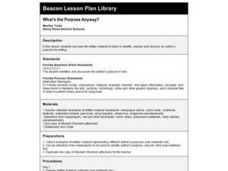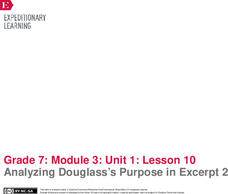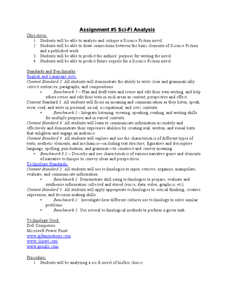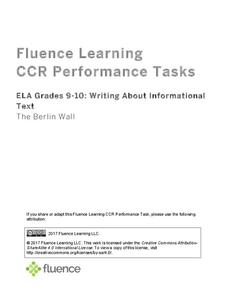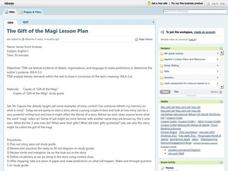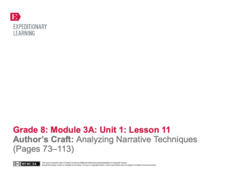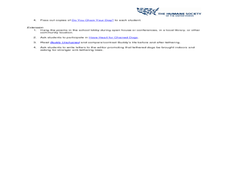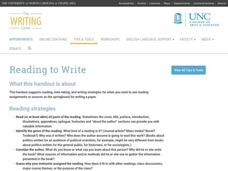Florida Center for Reading Research
Comprehension: Text Analysis, Persuade, Inform, and Entertain Sort
Why do authors write? Practice determining the author's purpose with a categorizing activity. Learners sort twelve short passages into three categories: persuade, inform, and entertain.
Curated OER
Analyzing Two or More Nonfiction Texts
How does recognizing the author's purpose help you draw conclusions about a topic? Using two articles (both are attached), learners brainstorm why each author wrote each article. Are their purposes similar or different? Learners use a...
Curated OER
What's the Purpose Anyway?
Examine author's purpose in newspaper articles, comic books, cookbooks, encyclopedias and other forms of written materials. Working in groups, middle and high schoolers read teacher-selected articles and write an explanation of the...
Florida Center for Reading Research
Comprehension: Text Analysis, Fiction and Nonfiction Find
Scholars analyze fiction and nonfiction text and fill in a worksheet detailing the text's title, genre, and reason for its classification.
Curated OER
Letter of Complaint
Learners analyze this letter of complaint to the city council by answering nine short-answer questions. They examine author's purpose, word choice, claims, rhetorical questions, and general observations. There is a focus on constructive...
Curated OER
Understanding Points of View
Investigate the importance of author's point of view. Young linguists study primary source documents related to the Treaty of Casco Bay. The first source is authored by the Native American Chiefs, the second by an English...
K12 Reader
What's the Purpose? FDR's Pearl Harbor Speech
FDR's December 7, 1941 address to the nation is the focus of a reading comprehension exercise that asks middle schoolers to read an excerpt from the Pearl Harbor speech and determine the president's purpose.
EngageNY
Analyzing Douglass’s Purpose in Excerpt 2
Learners revisit Plantation Life to focus on Douglass's purpose and choices he made for writing the text. They complete text-dependent questions, an analysis note catcher, and finalize their thoughts by sharing out with the class.
Curated OER
Assignment #5 Sci-Fi Analysis
Class members select a science fiction novel for independent study. To verify they have completed the reading, they write a summary, a critique, and an outline of the plot for a sequel or prequel. They then deliver a five-minute speech,...
Fluence Learning
Writing About Informational Text The Berlin Wall
On June 26, 1963 President John F. Kennedy delivered his famous "Ich bin ein Berliner" speech close to the Berlin Wall at the Rudolph Wilde Platz. On June 12, 1987 President Ronald Reagan Delivered his famous "Mr. Gorbachev, tear down...
Curated OER
Using the Interactive Model to Explore an Authentic Written Text
Bring literature to your Spanish classroom! Small groups will read one of the selected texts from Cuentos De Eva Luna. After analyzing the text, learners will create mini-quizzes for their classmates and create a presentation discussing...
Curated OER
The Gift of the Magi
Test the true meaning of giving - and irony - with this lesson about "The Gift of the Magi." Using textual analysis, details, and text organization, middle schoolers make predictions about future events in the story and determine the...
Curated OER
Summer of the Monkeys
While reading the book Summer of the Monkeys by Wilson Rawls, the class ties together the core reading objectives, which are making predictions, comprehending new information, reading for author's purpose, independence in reading, and...
EngageNY
Author’s Craft: Analyzing Narrative Techniques (Pages 73–113)
Scholars discuss a reading selection in Unbroken by writing to a partner about text selection. After completing the writing, learners revisit the use of active and passive sentences by reviewing a second Active and Passive Sentences...
Southern Nevada Regional Professional Development Program
Common Core Reading Standards: Understanding Argument
What does your class know about logical fallacies? They can find out quite a bit and practice identifying logical fallacies if you follow the steps and use the resources provided here! After reviewing ethos, pathos, and logos, ask small...
Penguin Books
A Teacher's Guide to the Signet Classic Edition of The Crucible by Arthur Miller
A 20-page guide is a must-have for any instructor, seasoned veteran, or first year-teacher, using Arthur Miller's The Crucible as an anchor text. The guide begins with extensive background information about Miller and the McCarthy era...
Curated OER
Daughters Come of Age in Women's Fiction
Introduce your young readers to fiction written by women authors. For each story, they explore the way these daughters discover and claim their own identities. Individually, class members use the literature to examine their role in their...
Curated OER
Poetic Justice: Understanding the Life of a Tethered Dog
The Humane Society provides a lesson in which class members explore the issue of tethering dogs. Through the resources used -- a comic, a poem, and narrative and expository writings -- class members realize that messages can be conveyed...
Idaho State Department of Education
Lessons for Social Studies Educators
Point of view, purpose, and tone: three concepts readers of primary and secondary source materials must take into account when examining documents. Class members view a PowerPoint presentation and use the SOAPS strategy to identify an...
Curated OER
Ornithology and Real World Science
Double click that mouse because you just found an amazing lesson! This cross-curricular Ornithology lesson incorporates literature, writing, reading informational text, data collection, scientific inquiry, Internet research, art, and...
University of North Carolina
Reading to Write
Silly journal and essay prompts may be fun to write, but they don't model the kind of writing needed for college papers and standardized tests. The 15th part in a series of 24 covers the concept of reading to write—during and after...
Southern Nevada Regional Professional Development Program
Reading Literature - An Occurrence at Owl Creek Bridge
“An Occurrence at Owl Creek Bridge,” Ambrose Bierce’s short story, is used to model how structural moves, the decisions an author makes about setting, point of view, time order, etc., can be examined to reveal an author’s purpose. Groups...
Curated OER
Neighborhood or Slum? Snapshots of Five Points: 1827-1867
How has your local neighborhood changed throughout recent history? Young researchers evaluate census data, images, and primary source descriptions describing the living situation in the antebellum Five Points neighborhood. They consider...
Curated OER
Fiction vs. Nonfiction
Students explore fiction and nonfiction writing. They identify the elements of fiction in a short story and identify the criteria necessary in a nonfiction piece. Students distinguish the author's purpose in an expository text,...




